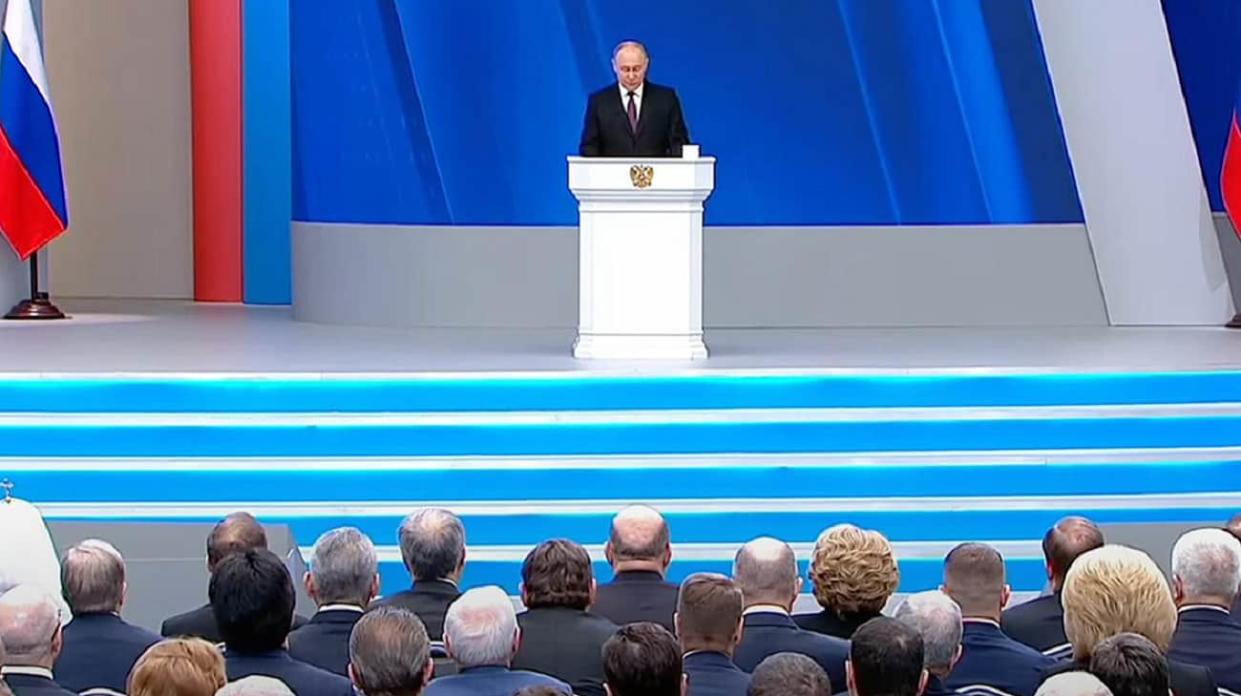ISW: Putin uses nuclear rhetoric to draw Western attention to himself and for propaganda

- Oops!Something went wrong.Please try again later.
During his speech to the Federal Assembly, Russian leader Vladimir Putin used rhetoric about negotiations and nuclear weapons rattling to draw Western attention to his speech and to advance the Kremlin's ongoing information operations.
Source: the Institute for the Study of War (ISW)
Details: Putin reiterated his ostensible willingness to engage in dialogue with the United States on "strategic stability" and continued to hold the United States responsible for the lack of talks.
Putin argued that if the US wants to discuss important security issues, Russia's national interests must be taken into account.
ISW stressed that Putin continues to pursue his maximalist goals in Ukraine; he wants Ukraine's complete surrender, and he also aims to weaken and disarm NATO, which he sees as an integral part of Russia's national interests.
Currently, the Kremlin is conducting an information operation simulating an interest in negotiations to encourage the West to make concessions on Ukraine's sovereignty and territorial integrity.
Putin also stressed that Russia possesses weapons capable of striking Western countries and said that Western escalation threatens a possible nuclear conflict that could destroy civilisation.
Military analysts have noted that Putin and Russian officials often invoke nuclear threats to instil fear in Western audiences and weaken Western support for Ukraine.
The Kremlin has not escalated significantly in response to the provision of new Western systems to Ukraine, and ISW continues to assess that Russia's use of nuclear weapons in Ukraine and beyond is highly unlikely.
To quote the ISW’s Key Takeaways on 29 February:
Ukrainian officials are reportedly concerned about the possibility of significant Russian territorial gains in the Summer of 2024 in the event of continued delays in Western security assistance.
Russian President Vladimir Putin used his 29 February address to the Federal Assembly to attempt to convince the Russian public that his next term as president will be defined by Russian military success in Ukraine but not at the expense of stagnating or decreased social and economic welfare.
Putin used tired rhetoric about negotiations and nuclear sabre rattling during his Federal Assembly speech, likely to seize on Western attention to the speech to promote ongoing Kremlin information operations.
Putin emphasised the Kremlin’s domestic focus on 2024 as the "Year of the Family" to address Russia’s ongoing demographic crisis during his Federal Assembly address.
Putin did not respond to the 28 February request from the Congress of Deputies from pro-Russian Moldovan breakaway region Transnistria, but this lack of response still affords the Kremlin several possible courses of action (COA) at a later time.
Ukrainian forces downed three more Su-34 fighter aircraft in eastern Ukraine on 28-29 February.
The Kremlin continues to assert its self-arrogated right to enforce Russian federal law on citizens of NATO member and former Soviet states over actions taken within the territory of their own countries.
Armenian Prime Minister Nikol Pashinyan stated that Russian-led Collective Security Treaty Organization (CSTO) is a threat to Armenian security as Russian officials refused to acknowledge Armenia’s reduced participation in the CSTO.
The Kremlin has reportedly established high-level positions in all federal bodies to promote patriotism and history within each body, likely aimed at strengthening informational and ideological control over federal employees.
Russian forces made confirmed advances near Avdiivka amid continued positional engagements along the frontline on 29 February.
Russian state-owned defence conglomerate Rostec Head Sergei Chemezov stated on 29 February that Rostec plans to produce A-50 long-range radar detection aircraft on an unspecified schedule because Russian forces require more A-50 aircraft.
Occupation officials continue to support Kremlin efforts to gain further control over religious groups in occupied Ukraine.
Support UP or become our patron!

